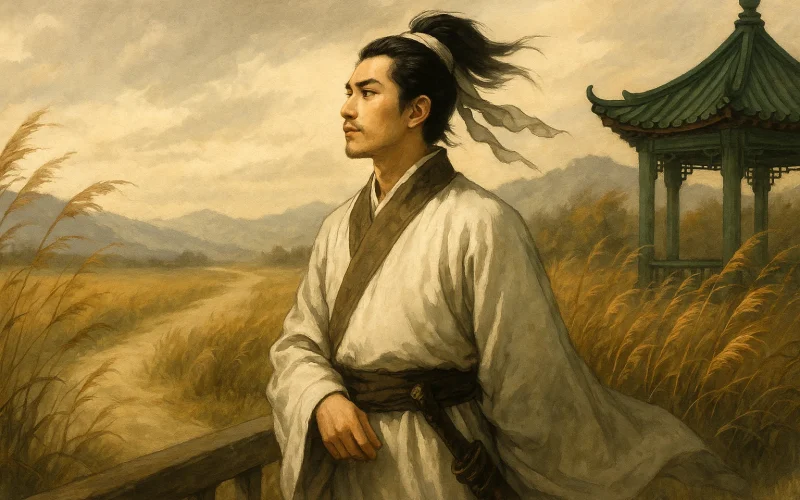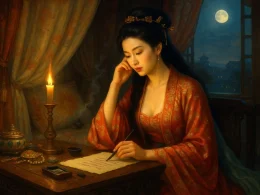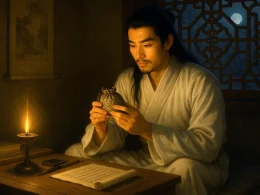The Dipper spans the sky—night soon will fade,
A sorrow-laden soul leans on moonlight, lost in thought.
Suddenly from painted towers, Qin zither’s notes cascade—
I know the Zhao maiden next door its strings has wrought.
The melody conjures her dark brows, drawn in tender grace,
The hurried tune pities her jade fingers, chilled in their play.
Yet barred by locks, her silver strings I cannot face—
Better to sleep and seek her music in dreams’ sway.
Original Poem
「闻邻家理筝」
徐安贞
北斗横天夜欲阑,愁人倚月思无端。
忽闻画阁秦筝逸,知是邻家赵女弹。
曲成虚忆青蛾敛,调急遥怜玉指寒。
银锁重关听未辟,不如眠去梦中看。
Interpretation
Composed during the Tang Dynasty, this lyrical piece captures a moment of nocturnal contemplation and musical resonance. Though historical records about the author Xu Anzhen are scarce, the poem reveals a delicate sensibility attuned to subtle emotions. It depicts a solitary night where the poet, sitting beneath the moon, suddenly hears the zither music of a neighboring maiden—their souls harmonizing through the ethereal melody. Such themes were common in mid-to-late Tang poetry, reflecting scholars' inner solitude and sensitivity to beauty.
First Couplet: "北斗横天夜欲阑,愁人倚月思无端。"
Běidǒu héng tiān yè yù lán, chóu rén yǐ yuè sī wú duān.
The Dipper spans the sky as night wanes deep; A sorrowful soul leans on the moon, thoughts boundless as they seep.
The opening lines paint a quiet, chilly nightscape. "The Dipper spans the sky" marks the late hour, while "a sorrowful soul leans on the moon" introduces the poet’s loneliness, setting the stage for the emotional ripples stirred by the zither’s song.
Second Couplet: "忽闻画阁秦筝逸,知是邻家赵女弹。"
Hū wén huà gé qín zhēng yì, zhī shì línjiā Zhào nǚ tán.
Suddenly, from painted towers, a Qin zither’s notes take flight— I know it’s the Zhao maiden next door, playing in the night.
The unexpected music shatters the night’s solitude. "Painted towers" evoke an elegant setting, while "Zhao maiden" (a classical trope for a refined beauty) merges the player’s image with her artistry, adding a layer of poetic ambiguity.
Third Couplet: "曲成虚忆青蛾敛,调急遥怜玉指寒。"
Qǔ chéng xū yì qīng é liǎn, diào jí yáo lián yù zhǐ hán.
As the melody ends, I envision her dark brows softly furrowed; In swift passages, I pity her jade fingers, chilled and sorrowed.
Lost in the music, the poet imagines the musician: her brows knit in concentration, her fingers cold yet deft. The tender description praises her skill while hinting at the melancholy beneath the notes, blending admiration with empathy.
Fourth Couplet: "银锁重关听未辟,不如眠去梦中看。"
Yín suǒ chóng guān tīng wèi pì, bùrú mián qù mèng zhōng kàn.
Layered gates and silver locks bar the way to her retreat; Better to sleep and seek her zither in dreams, bittersweet.
The poem closes with resigned elegance—the physical barriers ("layered gates and silver locks") separate reality from longing, yet the poet transcends this through dreams. The ending is both an acknowledgment of earthly limits and a lyrical surrender to the imagination.
Holistic Appreciation
"Hearing a Neighbor Play the Zither " is a lyrical poem rich in imagery and musicality. Against the backdrop of a quiet night, the poet first lays out his melancholy, then pivots with the sudden sound of a zither, triggering a series of delicate and poignant associations. Though the "Zhao maiden" is never directly described, she becomes a vessel for emotion through the music she plays. The poem avoids explicit emotional declarations, instead using scenery to evoke feeling and sound to convey meaning—ethereal yet profound, embodying the refined elegance prized in Tang literati aesthetics.
Artistic Merits
The poem's language is graceful and mellifluous, seamlessly blending scene and emotion. It excels in detailed imagery and the interplay of reality and imagination. Phrases like "the North Star," "leaning against the moon," "painted pavilion," and "jade fingers" construct a space both tangible and dreamlike. Meanwhile, lines such as "vaguely recalling," "aching from afar," and "seen in a dream" deepen the lyrical essence through psychological insight. The poem reveals profound emotion through restraint and truth through ethereality, showcasing the refined subtlety characteristic of mid-Tang poetry.
Insights
This poem teaches us that artistic beauty often arises unexpectedly. What truly moves the heart is not just the music itself, but the listener's solitary perception and the resonance of the soul. It reminds us that even when reality is barred by heavy gates, encounters of spirit and art can transcend physical boundaries, finding deep echoes in dreams, imagination, and emotion.
About the poet
Xu Anzhen (徐安贞, 698–784), originally named Chu Bi, courtesy name Zizhen, was born in Longqiu, Xin'an (modern-day Longyou, Zhejiang). A Tang dynasty jinshi (imperial examination graduate), he served as Acting Minister of Works and Vice Director of the Secretariat-Chancellery (functioning as de facto chancellor when the post was vacant). He was especially skilled in five-character verse. After his death, he was buried in Xujiafang, Sandun Township, Pingjiang County. His tomb survives today as a key cultural heritage site in Yueyang.











